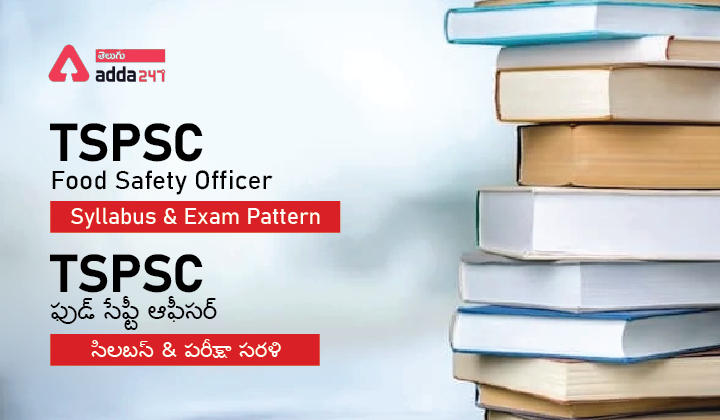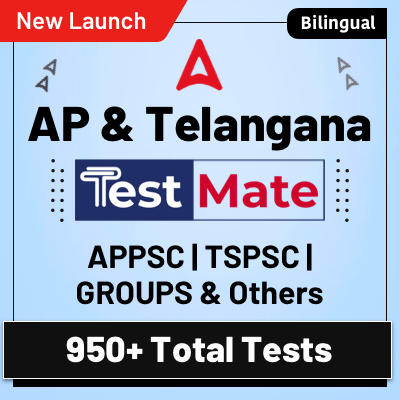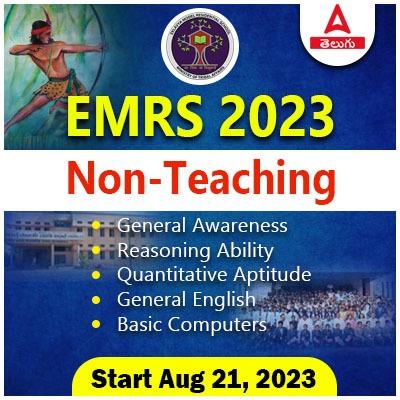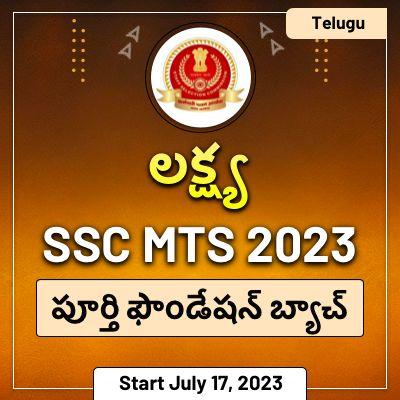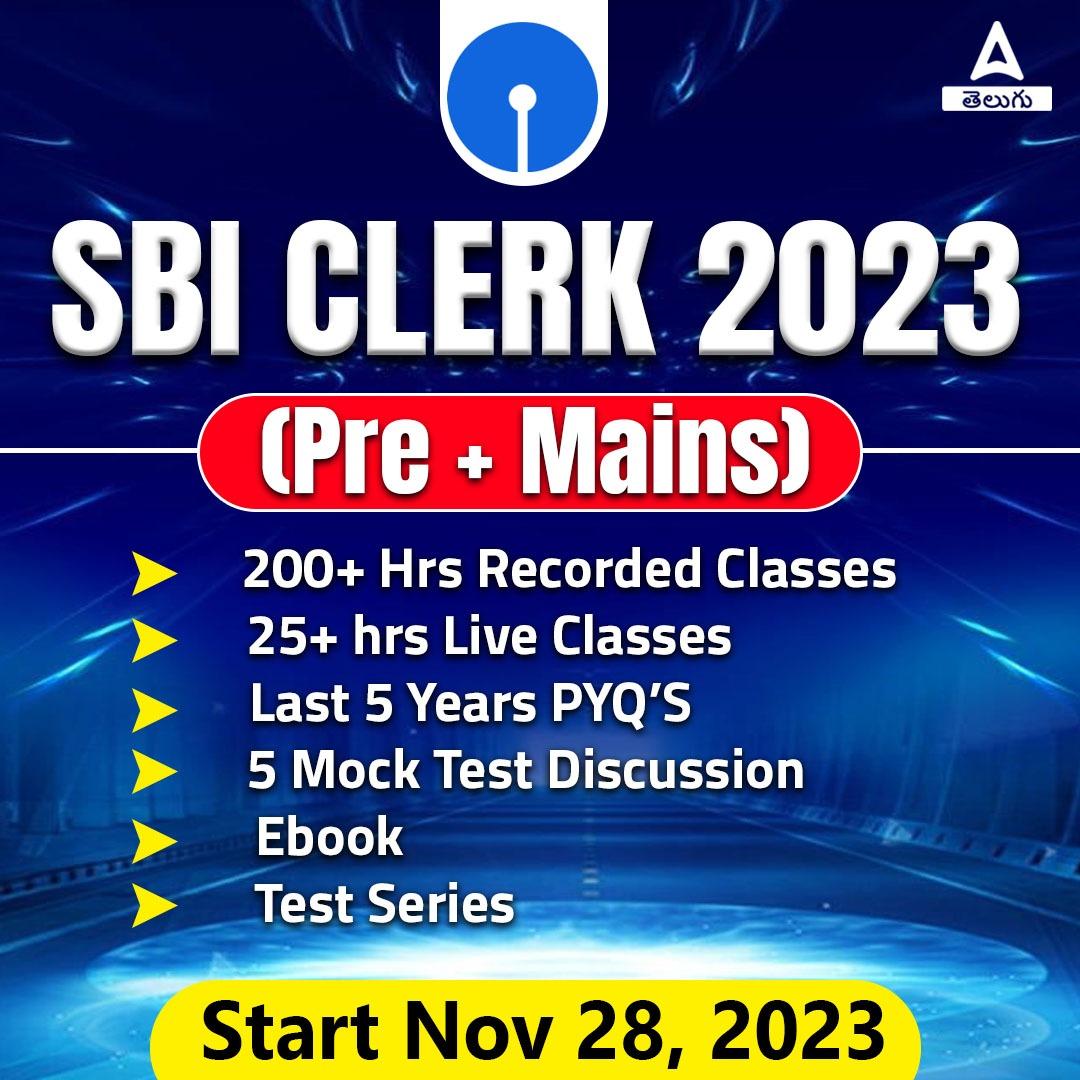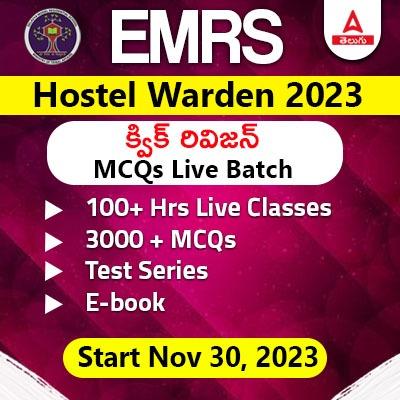TSPSC Food Safety Officer Syllabus
TSPSC Food Safety Officer Syllabus (TSPSC FSO Syllabus): The Telangana State Public Service Commission (TSPSC) has issued a Syllabus and Exam pattern along with Official notification for 24 vacancies of Food Safety Officer (FSO). All Interested and qualified candidates can check here for a detailed Syllabus and Exam pattern for Food Safety Officer (FSO).
TSPSC FSO Syllabus
| Vacancy Name | Food Safety Officer (FSO) |
| Total Vacancies | 24 |
| category | Syllabus & Exam Pattern |
TSPSC ఫుడ్ సేఫ్టీ ఆఫీసర్ సిలబస్ & పరీక్షా సరళి 2022 : తెలంగాణ స్టేట్ పబ్లిక్ సర్వీస్ కమిషన్ (TSPSC) ఫుడ్ సేఫ్టీ ఆఫీసర్ (FSO) 24 ఖాళీల కోసం అధికారిక నోటిఫికేషన్తో పాటు సిలబస్ మరియు పరీక్షా సరళిని విడుదల చేసింది. ఆసక్తిగల మరియు అర్హత కలిగిన అభ్యర్థులందరూ ఫుడ్ సేఫ్టీ ఆఫీసర్ (FSO) యొక్క వివరణాత్మక సిలబస్ మరియు పరీక్షా సరళి కోసం ఇక్కడ తనిఖీ చేయవచ్చు.

APPSC/TSPSC Sure shot Selection Group
TSPSC Food Safety Officer 2022
తెలంగాణ పబ్లిక్ సర్వీస్ కమిషన్ సాధారణ రిక్రూట్మెంట్ ద్వారా 24 ఖాళీల కోసం TSPSC ఫుడ్ సేఫ్టీ ఆఫీసర్ నోటిఫికేషన్ 2022ని విడుదల చేశారు. నోటిఫికేషన్ యొక్క పూర్తి సమాచారాన్ని ఇక్కడ తనిఖీ చేయండి.
| Organization Name | Telangana Public Service Commission (TSPSC) |
| Vacancy Name | Food Safety Officer (FSO) |
| Total Vacancies | 24 |
| Selection Process | Written Examination and verification of Certificates |
| Starting Date to Apply | 29th July 2022 |
| Last Date to Apply | 26th August 2022 |
| Category | Govt Jobs |
| Official Website | www.tspsc.gov.in |
TSPSC Food Safety Officer 2022 Selection Process (TSPSC ఫుడ్ సేఫ్టీ ఆఫీసర్ 2022 ఎంపిక ప్రక్రియ)
- TSPSC ఫుడ్ సేఫ్టీ ఆఫీసర్ 2022 పోస్టులకు నియామకం కోసం అభ్యర్థుల ఎంపిక CBRT/OMR ఆధారంగా వ్రాత పరీక్ష (ఆబ్జెక్టివ్ టైప్) ద్వారా చేయబడుతుంది మరియు వ్రాత పరీక్షలో సాధించిన మార్కుల ఆధారంగా పోస్టులకు ఎంపిక చేయబడుతుంది.
- మెరిట్ క్రమంలో రాత పరీక్షలో అర్హత సాధించిన అభ్యర్థులను సర్టిఫికెట్ల వెరిఫికేషన్ కోసం పిలుస్తారు
TSPSC Food Safety Officer 2022 Exam Pattern (TSPSC ఫుడ్ సేఫ్టీ ఆఫీసర్ 2022 పరీక్షా సరళి)
TSPSC FSO Exam Pattern In Detail:
- ఫుడ్ సేఫ్టీ ఆఫీసర్కు రాత పరీక్ష 300 మార్కులకు నిర్వహిస్తారు.
- FSO పరీక్షలో 2 పేపర్లు ఉంటాయి.
- పేపర్ 1-జనరల్ స్టడీస్, అండ్ జనరల్ ఎబిలిటీస్-150 మార్కులు-150 ప్రశ్నలు-150 నిమిషాలు
- పేపర్ 2-డిప్లొమా స్థాయి సబ్జెక్ట్-150 మార్కులు-150 ప్రశ్నలు-150 నిమిషాలు
| Written Examination (Objective Type) | No. of Questions | Duration (Minutes) | Maximum Marks |
| Paper-I: General Studies and General Abilities |
150 |
150 |
150 |
| Paper-II: Concerned Subject (Degree Level) Common for all |
150 |
150 |
150 |
| Total | 300 | ||
గమనిక:
పేపర్-I: జనరల్ స్టడీస్ మరియు జనరల్ ఎబిలిటీస్: ద్విభాషా అంటే, ఇంగ్లీష్ మరియు తెలుగు లో నిర్వహిస్తారు
పేపర్-II: సంబంధిత సబ్జెక్టు (డిగ్రీ స్థాయి) : అందరికీ : ఇంగ్లీష్ లో నిర్వహిస్తారు
| Telangana Study Note | |
| Telangana History | Telangana State Formation – Movement |
| Telangana Economy | Telangana Government Schemes |
| Telangana Current Affairs | Other Study Materials |
TSPSC Food Safety Officer 2022 Syllabus (TSPSC ఫుడ్ సేఫ్టీ ఆఫీసర్ 2022 సిలబస్)
TSPSC ఫుడ్ సేఫ్టీ ఆఫీసర్ 2022 ఆసక్తిగల మరియు అర్హత కలిగిన అభ్యర్థులందరూ ఫుడ్ సేఫ్టీ ఆఫీసర్ (FSO) యొక్క వివరణాత్మక సిలబస్ మరియు పరీక్షా సరళి కోసం ఇక్కడ తనిఖీ చేయవచ్చు
Paper I General Studies and General Abilities
Current Affairs
- Regional, National and International
- International Relations and Events.
- General Science; India’s achievements in Science and Technology
- Environmental issues and Disaster Management
- Economy of India and Telangana
- Geography of India with a focus on Telangana
- Indian Constitution and Polity with a focus on local self Government
- Society, Culture, Heritage, Arts and Literature of Telangana
- Policies of Telangana State
- History of Modern India with a focus on Indian National Movement
- History of Telangana with special emphasis on Movement for Telangana Statehood
- Logical Reasoning, Analytical Ability and Data Interpretation
- Basic English
Paper-II Concerned Subject (Common for All)
1. Food Chemistry
Carbohydrates -Structure and functional properties of mono, di & oligo- polysaccharides including starch, cellulose, pectic substances and dietary fiber; Proteins – Classification and structure of proteins in food. Lipids-Classification and structure of lipids, Rancidity of fats, Polymerization and polymorphism; Pigments-Carotenoids, chlorophylls, anthocyanins, tannins and myoglobin; Food flavours-Terpenes, esters, ketones and quinones; Enzymes-Enzymatic and non-enzymatic browning in different foods
2. Food Microbiology, Hygiene & Sanitation
Characteristics of microorganisms-Morphology, structure and detection of bacteria, yeast and mold in food, Spores and vegetative cells; Microbial growth in food- Intrinsic and extrinsic factors, Growth and death kinetics, serial dilution method for quantification; Food spoilage- Contributing factors, Spoilage bacteria, Microbial spoilage of milk and milk products, meat and meat products; Food borne disease-Toxins produced by Staphylococcus, Clostridium and Aspergillus; Bacterial pathogens- Salmonella, Bacillus, Listeria, Pseudomonas, Candida, Escherichia coli, Shigella, Campylobacter; Food Hazards of natural origin – sea food toxins, biogenic amines, alkaloids, phenolic compounds, protease inhibitors and phytates. Types of hazards, biological, chemical, physical hazards, importance of safe foods. Priniciples and methods of food preservation. Hygiene and sanitation in food sector – pest control measures, Garbage and Sewage disposal, Water – Sources, purification, Hazards Analysis & Critical Control Point (HACCP), Good Manufacturing Practices (GMP), Good Hygienic Practices (GHP), Good laboratory Practices (GLP).
3. Food Processing Technology
Food processing- structure, composition, nutritional significance and types of processing methods for various categories of foods: Cereals (Rice-milling, parboiling, Barley- Pearling, malting, brewing, Corn- wet and dry milling, Wheat-milling, pulses (milling, germination, cooking, roasting, frying, canning and fermentation), and oil seeds (extraction and refining), Fruits & vegetables (canning, drying and dehydration, concentration, freezing, IQF, thawing and fermentation); plantation crops (primary and secondary processing of Tea, Coffee and Cocoa), Spices (Oleoresin and essential oil extraction), Meat, fish and poultry (ante mortem inspection, slaughtering and dressing, post mortem examination, canning, curing, smoking, freezing, dehydration and fermentation), eggs (quality inspection and dehydration) milk (receiving, separation, clarification, pasteurization, standardization, homogenization, sterilization, UHT and fermentation). Unit operations of food processing – grading, sorting, peeling and size reduction. Product development – Consumer trends and their impact on new product development; stages- to conceive ideas, evaluation of ideas, developing ideas into products, test marketing and commercialization; criteria for selection of raw materials, sensory evaluation, objective evaluation, standardization.Types & functions of packaging materials including smart packaging and biodegradable materials used in foods. Packaging material as a threat, impact on health and controlling measures. Surveys – types, sampling procedures for conducting surveys and for quality control.
4.Food Laws and Organizations
Laws and Regulations – Brief review of regulatory status in India before the advent of FSSAI: FPO, MMPO, MFPO, Prevention of Food Adulteration Act, Paradigm shift from PFA to FSSAI; Overview of Food Safety Standards Act 2006, Food Safety Standards Rules & Regulations, 2011 (Licensing and registration of food businesses, Food product standards & Additives, Packaging & labelling, Contaminants, toxins an residues,Laboratory and sample analysis, Prohibition and restriction on sales), Organizational hierarchy, Powers and duties of Food business Operator, Food Safety Officer, Designated Officer, Food Analyst; Food recall and Traceability, Other Acts: Essential commodities Act, Legal Metrology Act, AGMARK Codex Alimentarius – development and issue of standards, Committees under Codex, role in maintaining harmony in food standards. National Organizations – Bureau of Indian Standards, ICMR, ICAR, NABL, Council for social welfare, Ministry of Health & Family Welfare – delivery Health Services in India. Export and Quality Control through Export Inspection Council (EIC), APEDA and MPEDA. International Organizations FAO (Food & Agriculture Organization), WHO (World Health Organization), ISO, WTO, APLAC, ILAC.
5. Public & Occupational health and Nutrition
Public Health: Definition of Public Health and Associated Terms, Current Concerns in Public Health : Global and Local, Core functions and scope of public health, History of public health and evolution of Public Health, Concept of health and disease, Natural history of disease, Levels of prevention, Concept of health and disease, Natural history of disease, Determinants of health, Infectious Disease and Germ Theory, Introduction to public health ethics, Globalization and Health, Governance in Health, International Health Regulations, Indian Health Systems. Occupational Health – health of workers in industries safety measures, occupational diseases. Nutrition – Assessment of nutritional status, Balanced diet, food sources of nutrients, essential vitamins, amino acids and fatty acids, their deficiency diseases and toxicity, PER, Recommended dietary allowances for various nutrients, Antinutrients, clinical and diet surveys. Programmes on Nutrition in India (mid-day meals at schools, anganwadi systems, ICDS, NIDDCP, NNAPP, WIFS, National Food Security Mission, SABLA, FSSAI initiatives on food fortification, FFRC, FFWP, NPPNB due to VAD, NGCP).
TSPSC Food Safety Officer Minimum Qualifying Marks (TSPSC ఫుడ్ సేఫ్టీ ఆఫీసర్ కనీస అర్హత మార్కులు)
| వర్గం | క్వాలిఫైయింగ్ మార్కులు(%) |
| OC, Ex- Service men, Sports men & EWS | 40% |
| BCs | 35% |
| SC, ST and PH | 30% |
Current Affairs:
| Daily Current Affairs In Telugu | Weekly Current Affairs In Telugu |
| Monthly Current Affairs In Telugu | AP & TS State GK |
TSPSC Food Safety Officer Syllabus & Exam Pattern 2022-FAQs
Q1. TSPSC ఫుడ్ సేఫ్టీ ఆఫీసర్ 2022 పరీక్షలో ఎన్ని పేపర్లు ఉన్నాయి,?
జ : TSPSC FSO పరీక్షలో 2 పేపర్లు ఉంటాయి ఒక్కో పేపర్ కి 150 నిముషాలు సమయం కేటాయిస్తారు
Q2. TSPSC ఫుడ్ సేఫ్టీ ఆఫీసర్ రిక్రూట్మెంట్ 2022లో ఎన్ని ఖాళీలు ఉన్నాయి?
జ : 24 ఖాళీలు ఉన్నాయి
Q3. TSPSC ఫుడ్ సేఫ్టీ ఆఫీసర్ రిక్రూట్మెంట్ 2022 కోసం ఆన్లైన్లో దరఖాస్తు చేయడానికి ప్రారంభ తేదీ ఏది?
జ : 29 జూలై 2022.
**********************************************************************
మరింత చదవండి:
| తాజా ఉద్యోగ ప్రకటనలు | ఇక్కడ క్లిక్ చేయండి |
| ఉచిత స్టడీ మెటీరియల్ (APPSC, TSPSC) | ఇక్కడ క్లిక్ చేయండి |
| ఉచిత మాక్ టెస్టులు | ఇక్కడ క్లిక్ చేయండి |

